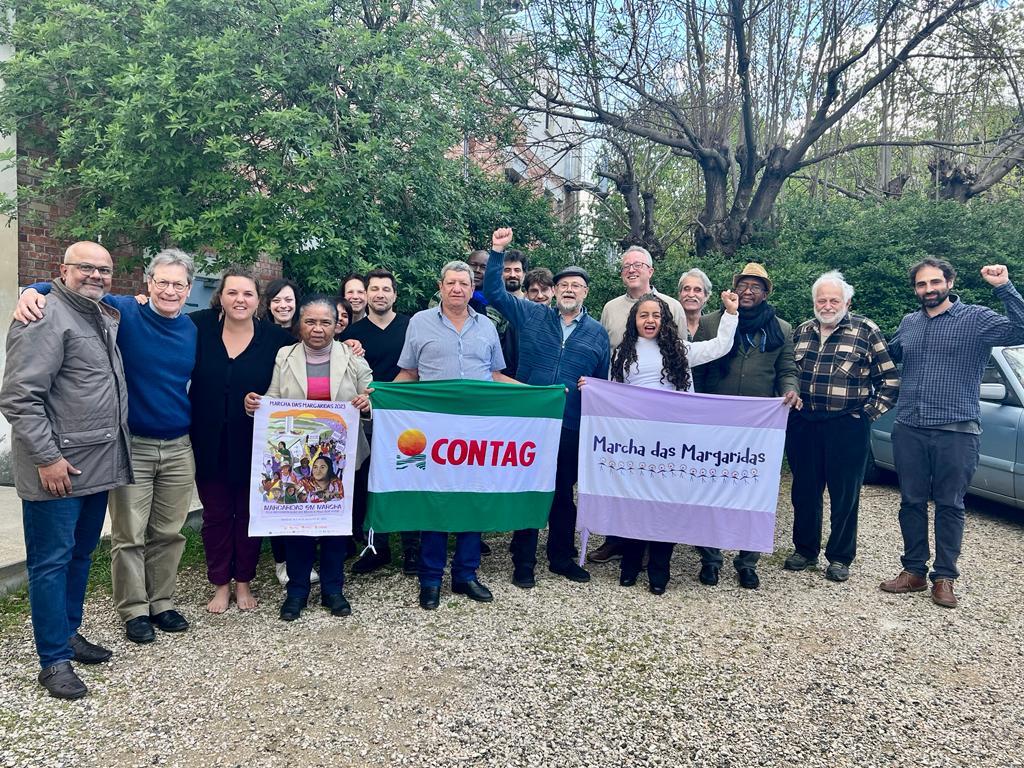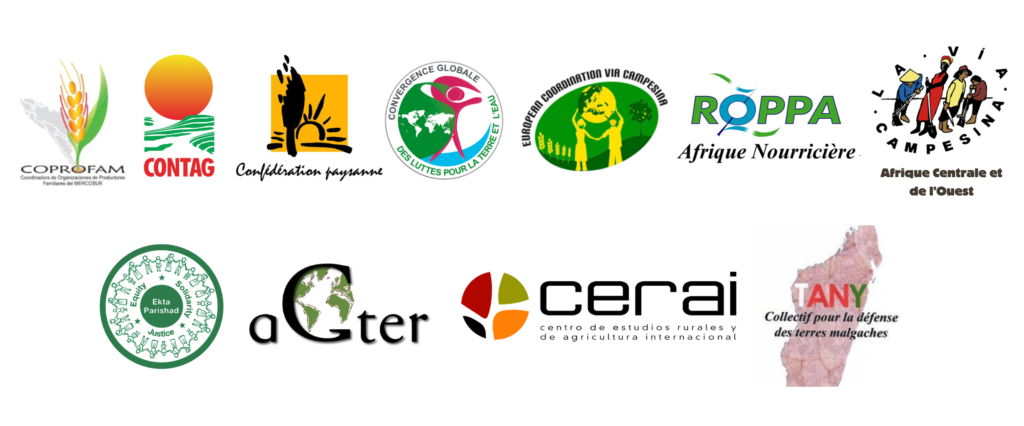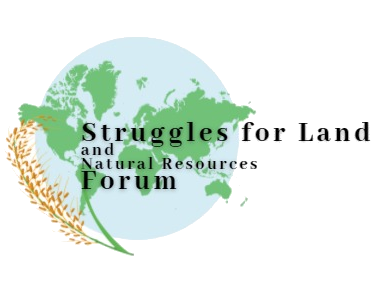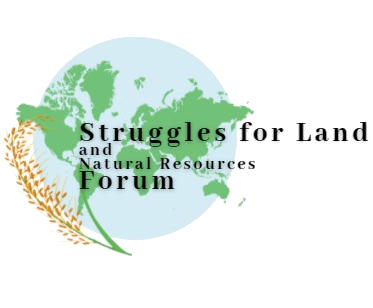Le Forum des Luttes pour la Terre et les Ressources Naturelles - General presentation

Building a future based on farming, pastoral, fishing and forestry communities with gender equality
The exploitation of natural resources for profits is destroying the planet
For more than 30 years, neo-liberal policies have accelerated land grabbing and the appropriation of natural resources by capitalist corporations. The leaders of these corporations and those who finance them exploit human beings as well as renewable resources in way that depletes the latter without maintaining worthy living conditions for the former. The general expansion of agribusiness and extraction companies, as well as the expansion of urban infrastructure, leads to the plundering or appropriation of the best lands, forests, rivers and seas, and also destroys the most sustainable forms of agriculture, livestock farming, agro-forestry and fisheries. It also disproportionately affects the social groups that depend on these activities - families and rural communities, indigenous peoples - and especially women. It obscures the future of young people. The mass exodus to slums increases poverty, and the opening of new fronts of forest clearance worsens the climate crisis. It is necessary to change the way land and natural resources are governed in order to address the environmental and human disaster that we call “development”.
The holders of capital - who do not themselves work on production and often do not even live where it takes place - demand maximum remuneration for their "investments". The objective of short-term financial returns in agricultural and forestry production and fisheries is inconsistent with the fair distribution ecosystems benefits and the wealth created from them. This objective of maximising profits is also inconsistent with the preservation of water, soil fertility, biodiversity and climate. It produces a decrease in the number of employees and lowers their salaries, and has a tendency to minimise contributions to public budgets by avoiding taxes and seeking subsidies instead. Cost cutting also leads to the refusal to absorb the costs of long term environmental and agro ecological preservation, and to increasing net labour productivity through the use of new energy sources, mainly fossil fuels.
The use of natural resources as "Commons" is promising if we make progress in gender equality
Rigorous scientific comparisons of different forms of production show us a clear result: Peasant farming in all its forms; livestock farming, traditional and artisanal fishing and community forestry; and other farms relying primarily on family labor rather than hired hands, are far more likely to ensure individual and group well-being. Not only because they can ensure greater wealth creation per unit area for more workers and the diversification of agro-ecosystems, but also because they are at the core of our cultural identities. They call on the greater empirical intelligence of each individual to deal with the natural environment and its changes. By destroying traditional peasant knowledge and the farmer’s autonomy to make decisions, agrarian proletarianisation takes away the capacity for individual and collective fulfilment.
This of course goes without saying that traditional customs very often perpetuate a regime of masculine domination and the cultural, political and socio-economic marginalisation of women. This is often demonstrated by unequal and precarious rights to land and resources, where women are often given land of lesser quality. Denying women equal rights is identical to denying women the same possibilities of well-being and fulfilment. This is all the more unacceptable as women are responsible for the majority of food production and the work necessary for the continuing existence of the community. Revealing this truth in every place where it is denied by traditions or national laws, is a priority. It is thus fundamental to both prioritise a social transformation for the emancipation of women, all the while protecting communities against land grabbers.
Land grabbing and the eviction of rural populations must be stopped
Land grabbing, the concentration of land rights in the hands of ever fewer people, accelerated from 2007 onwards with the so-called subprimes financial crisis. This crisis pushed large capital holders into the primary sector and provoked the takeover of vast tracts of land and forest. States have not taken any effective regulatory measures to protect rural, fisher and forestal communities. Nor have they questioned their decision to liberalise the global trade of agricultural goods in 1994 and which led to devastating consequences. The so-called international Marrakesh Agreement on Agriculture exposed the vast majority of farmers and fishers to direct competition from large, ultra-mechanised production units, without any form of protection. These ultra-modern farmers set rock-bottom global prices for agricultural commodities, and drive the least well-equipped families, who are also the most numerous, to ruin, as manual or animal-drawn agriculture is still the dominant model in the world today. Added to this is the extreme volatility of agricultural prices due to speculation on physical markets, but even more so on the markets that bear witness to the growing financialization of agriculture: futures markets, agribusiness stock markets, etc. The families of breeders are in the same way precarious, through the world market, by the capitalist animal production (hyper extensive or hyper intensive), as is the artisanal fishing by the industrialized fishing.
A multitude of peasant organisations and social movements, of which we are, have for decades condemned the disastrous transformation of the world's agricultural systems. These voices are standing up against the destruction of the pillars that hold up our common world: the peasants, fishing, pastoralist and forest communities, indigenous peoples. Several occasions were specifically devoted to the issue of defending their territories against land grabbers and to the redistribution of land in favor of the "landless.
1996 marked a founding stage of this global mobilization with the identification of the limits of the concept of food security brandished by the States at the World Food Summit. The World Forums for Food Sovereignty of 2001 in Havana (Cuba) and 2002 in Rome (Italy) responded to this.
In 2004, in Valencia (Spain), a number of peasant movements such as the Via Campesina, indigeonous people’s organisations and fishing communities, as well as experts, researchers and NGO’s, with the support of the CERAI, together organised the World Forum on Agrarian Reform (WFAR). The result was that, after having been missing for decades, agrarian reform once again returned to international discussions between States: and following the FAO’s call, some governments, including Brazil, organised in 2006, the International Conference of Agrarian Reform and Rural Development (ICARRD).
The Food Sovereignty Forum organised by the Via Campesina, at the Nyéléni Center in Sélingué (Mali)[1] in 2007, was a major mobilisation of peasant and rural movements that managed to maintain its momentum through regular gatherings.
In 2016, the World Forum on Access to Land (WFAL) was convened by numerous rural and urban citizen organisations, researchers and a few government institutions. The objective was to assess the pledges that had been made by governments at the ICARRD concerning more equitable land access. It quickly became obvious that the pledges had been a failure. Many national governments had then solemnly committed themselves to tackling the land issue. Ten years on however, and it was evident that our “leaders” had done nothing to remedy the urgent economic inequalities and misuse of natural resources that were undermining the planet.
Governmental action at an impasse
Despite these many years of mobilisation, and the progress of social movements at a global level, has not yet led to a shift in trends. The UN "Voluntary Guidelines for Responsible Governance of Land Tenure in Land, Fisheries and Forests" adopted by Committee on World Food Security (CFS) in 2012, or the UN "Declaration on the Rights of Peasants and Other Rural Workers" adopted by the UN General Assembly in 2018, are the result of a hard fought struggle by global peasant movements, led by La Via Campesina. However states have been careful not to make them binding. Their unwillingness to act effectively to protect rural, fishing and forest communities is unacceptable. Their public policies continue to enhance socially, economically and environmentally destructive actions by many companies and institutions.
The major declarations of the intergovernmental assemblies (UN, CFS) have forced peasant organisations, Commons defence associations and social movements to go head to head with each State to try and achieve concrete progress: support for peasant agriculture, food sovereignty demanded by the members of La Via Campesina and many organizations, and land governance that places human beings at the heart of its objectives. In the face of the growing land and natural resource grabbing and the eviction of rural peoples, binding tools must be put in place at a global level.
Giving up is not an option
Giving up is not an option. We have decided to contribute to the alliance of all those who understand the scale of the changes that are needed, but who are still too few in number on the scale of the world's population, half of which is now urbanised. Coordinating all these forces is in our opinion, necessary to bring attention to the big issues and their solutions to the greatest number of people. This is the only way to gain the political weight necessary to see them implemented. We also want to participate in the evolution of social relations and laws at national and community levels, toward gender equality.
Global exchanges to increase citizen movements for a true protection of the Commons
We, family farmers’ organisations and associations for the defence of the commons, propose to open up a new space for global exchanges. It’s objective? To contribute to the broadening of citizen alliances, in order to advance national and international regulations which are essential to protecting and supporting rural, fishing and forest communities and their resource uses against land-grabbers.
We want to help bring together rural and urban citizens' movements, along with researchers, to discuss the major issues concerning land access and natural resources and their use, and the necessary mobilisations and actions.
We propose firstly, to organise this discussion over five successive exchange periods, during the course of 2021, covering the following themes:
- Access to land for women and young people ;
- Landless people and the future of the natural commons ;
- Local land governance ;
- Agrarian reform and the conditions necessary for maintaining long term equitable distribution of land rights ;
- The regulation of transfers of rights to land and natural resources and other ways of concentrating these rights (e.g. transfers of shares in agricultural enterprises in Europe) ;
These themes reflect the major problems faced by rural, fishing and forest communities in different and complementary manners. They question the ways in which land and resource use rights are defined and distributed, the creation and sharing of the wealth produced from them, and, more broadly, the ways of life that are organised around the commons, which constitute ecosystems (plants and animals).
Open to all, each discussion will be initiated by a webinar where several points of view on the subject will be presented (including those of the inviting organisations). It will then continue online for two months to gather the participants' contributions in the form of opinions, simple accounts of experience, political proposals or demands and ideas for citizen action. The contributions can be sent in the form of texts, audio or video recordings. The dedicated website landaccessforum.org will allow exchanges without language barriers (at least in English, Spanish and French). The contributions will then result in the production of a summary document, managed by the participants.
A webinar, in addition to a physical meeting if health conditions allow it, will close the first series of thematic discussions with the aim of identifying the main courses of action that need to be implemented.
We look forward to seeing you register on the website as participants in the discussions and to subscribe to the online newsletter that will keep you informed of their schedule and progress.
We can no longer sit by and wait in hope for governments to take the necessary measures; we know this will never happen. We must take action!

Organizers - Steering committee members
- Family peasant and breeders organisations :
The Confederation of Family Producer Organizations of Greater Mercosur (COPROFAM, South America) represented by the National Confederation of Agricultural Workers (CONTAG, Brazil)
La Confédération paysanne (France)
The Global Convergence of Struggles for Land, Water and Peasant Seeds in West Africa (CGLTE-OA)
European Coordination Via Campesina (ECVC)
Ekta Parishad (India)
The Network of Farmers' and Producers' Organizations of West Africa (ROPPA)
La Via Campesina West and Central Africa.
- Associations for the exchange of experiences, analysis and action for the defence of the commons :
Association pour contribuer à l'Amélioration de la Gouvernance de la Terre, de l'Eau et des Ressources naturelles (AGTER, France)
Center for International Rural and Agricultural Studies (CERAI, Spain)
Collectif Tany pour la défense des terres malgaches (France, Madagascar)
1 ] Which became the International Training Center for Peasant Agroecology in Nyéléni.


